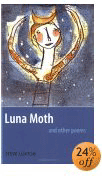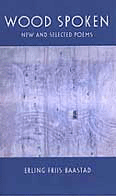Steve Luxton: Luna Moth and Other Poems

81 pages,
ISBN: 0919688918
Salvatore Ala: Straight Razor and Other Poems

61 pages,
ISBN: 0973588101
Erling Friis-Bastaad. Wood Spoken: New and Selected Poems

101 pages,
ISBN: 189675810X
Post Your Opinion | | Fluttering Without Soaring
by Linda Besner
Almost all of Erling Friis-Bastaad's poems address, in some form, Yukon landscape and
lifestyles. The early poems in Wood Spoken (which contains selections from one
previous book and three chapbooks) give us bears and bartenders, gold prospectors and
dancing girls who stay for a season and vanish, leaving the author behind for the winter's
long endurance. The most memorable item of this first section, "Local News", concerns
a young minister driven to nervous collapse by the seasonal crop of autumn suicides
among Dawson's young men. "Every loud noise made him jump," Friis-Bastaad writes,
"each splash in the river." The better toughened townsfolk "complain/ that their holy
man consorts/ with the loose and the addled./ The response seems so obvious/ the doctor
doesn't share it/ with his sedated friend." When Friis-Bastaad honestly pursues the
unique animating forces of his chosen setting, the result is a clear window onto a life
which, for most readers, will be awesomely unfamiliar. The ungenerous landscape
occasionally vouchsafes his striking epiphanies, as when the poem "Fortune" admonishes
us:
Here a mountain
chooses not
to topple upon us
There a river
confines its rage
between two banks
and we return home
convinced that our lives
are a matter of light
that one more day
has been handed down to us
through our eyes
The landscape is so large a presence that it needs only to be hinted-at to clinch the
emotional import of the author's reflections:
I never intended to live
so far from the sea
The boy I was
could not have fathomed
life on a mere river,
could not have fathomed
mere life
"Blockade"
Friis-Bastaad is very good at using concrete references that ground emotion in
experience. Rivers, marshes, and the sea wet the refrain of his speaker's longing for
"home", a place or sensation he has lost all hope of reaching or even describing. The
early poems, like "The Poet Divides His Time" are chiefly occupied with the speaker's
fruitless efforts to settle down and stay put, and although the author seems to have
ultimately reconciled himself to the choice he has made, an anxiety over place still chafes
his work. In "Boreal Summer", he frets:
I wish to register my concern,
my distress, with this
annual suppression of darkness,
this revocation
of our right to stars. How
are we to locate ourselves
if we look up, only to discover
a few blood-stained clouds
in our sky?
In his battle with language Friis-Bastaad seems to have decided that only the simplest,
most monolithic words will do; words like "ancient", "earth", "flames", and "song".
There is something windblown in the diction, a decision that it's best to begin already
sanded down, using only those adjectives that can survive eight months of ice. This type
of bare lyric has a heroic quality about it, presuming an authority, a hold over our
attention. Wood Spoken is also a decidedly backward-looking collection, both in that the
author is revisiting the poetic output of his younger self, and because even that young self
seems to have wished he were someone a little more legendary, living in an epic age that
has already passed him by. Friis-Bastaad's insistence on referring to himself as "the
poet" only highlights this sense of wanting to step into a readymade archetype. Odd then,
that for all his secure self-identification, his poems, in the end, emanate a sense of failure:
"the words, once/ again, too/ small", "words fail", "Our initials will serve/ There are
already too many words."
The idea of "the poet" plagues Salvatore Ala's Straight Razor and Other Poems to a
much more harmful degree. Despite Ala's obvious ear for cadence and the occasional
subtly-reversed phrase, Ala's reverence for literary tradition has misled him into thinking
that simply injecting the word "poetry" into what he writes will magically elevate his
musings to the level of poems. Scarcely a piece goes by without invocation to this muse
Poetry. Yet one can't leave it all to the benevolence of the gods: the author has to be
willing to do a little work of his own.
Like Friis-Bastaad, Ala has a liking for large-scale, mythic vocabulary. Ala's, however, is
soft and melting: love, beauty, garden, wave. Ala has many gliding, romantic city poems,
some of which succeed in tweaking the reader's expectations just enough to nudge us into
gentle realignment:
After rain, marble is sticking to wet leaves,
Walls are dripping with ivy,
Monuments and memorials
Cling lightly to the air.
In these cases the euphonious ease of Ala's writing carries the contradiction ("marble is
sticking to wet leaves", "Monuments and memorials / cling lightly to the air") so lightly it
penetrates our minds before we have a chance to resist it. Often, however, it is this very
smoothness which prevents Ala's poems from achieving a lasting impact. The syllables
flow so mellifluously that the words slip by without snagging on, and being held by,
ideas. Because there is little on the level of language which must be confronted, clashed
with, they feel oddly noiseless. Take the first two stanzas of "Visions of a Country
Road":
On each side of the country road
Lean tall old trees far into their shadows,
And you feel a desire to turn off
Into the landscape of yourself,
To the end of a road that never ends...
And all that solitude yours.
Go deeper, to where fence posts end,
Beyond the rusted out car
Now stranded in vines,
Where farm land becomes meadow and woodlot,
And the meadowlark is a clear song
Of space and light.
This poem is pleasant, innocuous, mild. No great revelation is expected, and none arrived
at. While inoffensive, this approach pulls the collection in a rather unremarkable
direction. Many of the poems deal with Ala's Italian heritage, with a series on barbers
dedicated to "my father, uncles, and cousins". These tend towards a melancholy nostalgia
which occasionally lights into eloquence, as with "Family Tragedies":
"My dear mongoloid cousin and namesake,/ Wallet-maker, scholar of bus routes". Some,
like "A Childhood Pharmocopoeia", or "Unloading Watermelons at the Windsor Market"
swell with sensual detail. Elsewhere, however, Ala's handling of the sensual is marred
by an extraordinary earnestness which leaves no room for humour. In a painful poem
called "Love in the Catacombs", he writes with no apparent irony, "Though we go
solemnly/ Through the catacombs,/ alone with you among the dead/ I sense the swelling
of my sex,/ I become engorged in the catacombs/ And feel the hardness of death". This is
not to say that a hard-on in the catacombs is not a fit poetic subject; do tell. But with this
opener, the writer's only salvation is either a healthy sense of the ludicrous or an
aggression of which Ala is not capable. He seems completely unaware of his readers'
probable reaction, and without this power of anticipation becomes untrustworthy as an
interpretative eye. In other places, where Ala does set the reader up to expect a profound
statement, the result is disappointing:
Does anyone stand at a window tonight?
Is there another person in all the world
Who grows transparent,
As the night and the stars
Pass into him?
Well, yes, one imagines so. Or,
So faint the imprint of this fossil leaf
It seems the thousand year old shadow
Of a falling leaf
The brevity of this poem is meant to invest it with the concentrated energy of a haiku. Yet
this choice exacts a philosophical repayment, a debt to the reader which is not here
discharged. In his last line, Ala closes the circle of meaning so quickly that the reader is
left in coat and hat at the door with one hand on the handle.
Although Steve Luxton does, in his new book, occasionally refer to himself as "the poet",
for the most part Luna Moth and Other Poems escapes the excessive concern with poetic
identity and the act of writing that mars the other two books under review. This, Luxton's
third collection, opens with a piece which enforces the primacy of physical experience,
its power to move the mind. At four years of age, the speaker is picked up by his father
and set on top of a seven-foot privet hedge, a "vast stiff brush beneath, a rolling wave,/
myriad rough palms and elbows that could not quite agree to hold me/ or shrug me
helpless off." This introduction does much to crack open Luxton's mental world, and the
collection confides to the reader not a few of these surprising and original pictures.
"Silver Whiskers" displays the figure of a dead mink found in a cedar hedge who "waxes
pharaonic":
Gone the feline sinews,
the lithe flesh,
fattened on mice and trout,
then spring-water slaked,
molted the furrier's plume,
once svelte ermine.
Rigid on my palm,
mighty Cheops in miniature,
grave-robbed,
time-stiffened,
plundered,
except for marvelous,
intact, silver whiskers.
With the dead animal being viewed with such curious, respectful interest, the apt
comparison is a credit to both pharaoh and animal. Luxton seems to be the most
unburdened of the three poets under review, which is odd since a modest few of the
poems published here deal with his experience of life-threatening brain cancer. In fact,
many of the pieces address death and illness in some way, whether as spectacle (the
mink, Hermann Goering, a long poem about a JFK assasination theme park) as myth and
song (Doc Holliday, a favourite character of his) or as something closer and altogether
more frightening: his father, the universe, himself. In these, as in the majority of his
poems, Luxton handles his subject matter best¨without indulging in self-pity, that is¨
when he confines himself to shorter pieces.
However, it isn't possible to grant the book unmixed praise. While Luxton's sense of
irony and his ability to zero in on the unusual instant invest the book with quirky truths,
the words chosen to convey these truths feel approximate; elements cohere, but don't
quite fuse. Much of the blame for this is to be laid upon less-than-keen editing, as often
the grammar and punctuation of these poems gets in the way of their meaning. One
extremely curious element of the punctuation at work here is a lavish use of that
contemporary grammatical underdog, the exclamation point. While it is perhaps
admirable to reclaim melodramatic punctuation as a form of protest against our staid
declarative, the effect is decidedly bizarre:
Soon, it is like someone upstream
blew the big old beaver dam,
floating the sky-high pile in the barn
through the kitchen into the bedroom!
"To See a Bull Moose"
On the river trail past dark
in phosphor moon
in fresh snow-piled
deadfallsÓ runes! "Boreal
Phantasmagoria"
Rising daylight reveals
a full-scale galleon!
"Spider Bend"
In addition to these surface irregularities, the collection suffers from a haphazard
arrangement of its individual components. The poems dealing with Luxton's hospital
time are so randomly interspersed that there is no chance for them to hold each other up,
and denied the dignity of a group, they bob to the surface in a rather ungainly manner.
For all Luxton's humour, and his sympathetic rendering of his environment, Luna Moth
flutters without soaring.
Linda Besner is the Book review editor for
The Dominion. She lives in Vancouver.
|